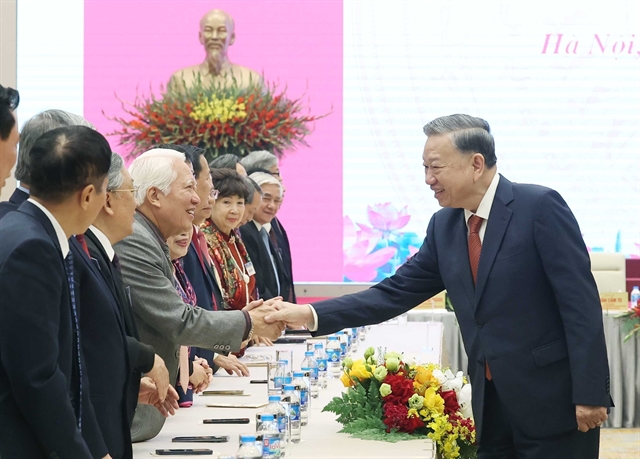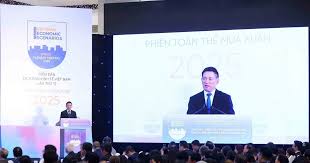 Politics & Law
Politics & Law

 |
| Deputy Prime Minister Hồ Đức Phớc gives a speech at the 17th Vietnam Economic Scenario Forum, Spring 2025 in Hà Nội. VNA/VNS Photo |
HÀ NỘI Deputy Prime Minister Hồ Đức Phớc attended the 17th Vietnam Economic Scenario Forum, Spring 2025 in Hà Nội yesterday. Phớc said the event served as a platform to generate innovative ideas to help the government and relevant ministries, sectors and localities refine their strategies for economic development in recent years.
The Deputy PM highlighted the country's achievements across 15 economic targets. Economic growth reached 7.09 per cent, with GDP valued at approximately US$476.3 billion, placing Việt Nam 33rd globally.
Last year, Việt Nam’s total import-export turnover was estimated at $800 billion, with a trade surplus of $24.77 billion. Budget revenue exceeded projections by 19.8 per cent, surpassing VNĐ2 quadrillion, a VNĐ336.5 trillion increase, reflecting the country’s progress in national development.
He said entrepreneurs, scientists and administrators have made significant contributions to achieving these results and underscored the importance of continued focus on supporting Việt Nam's growth and global standing.
Priorities
He outlined three main strategic priorities for the government, institutional reform, infrastructure development and human resource enhancement.
He said that in the second half of 2024, the government introduced key legal amendments aimed at addressing economic bottlenecks and improving resource mobilisation. These amendments included changes to the country’s Planning Law, Investment Law, Public-Private Partnership Law and the Bidding Law. These legal reforms are expected to enhance governance and drive further economic progress.
The government has been directing significant investments towards infrastructure, with VNĐ800 trillion earmarked for 2025. These funds will support critical projects, including the Long Thành Airport and the North-South high-speed railway, scheduled to break ground in 2027.
Additionally, other high-speed rail projects connecting Hạ Long, Hải Phòng, and Hà Nội to China are underway. Beyond transport, infrastructure investments will also cover power generation (including nuclear and renewable energy), industrial parks and economic zones. These initiatives are pivotal for transitioning to a green and digital economy.
Phớc stressed the importance of building a workforce that meets global standards.
“Mastery of technology depends on having high-quality personnel, and technological breakthroughs rely on effective technology transfer. Therefore, it is essential to focus on technology transfer and personnel training to ensure sustainable growth”, he said.
Deputy Head of the Party Central Committee’s Economic Commission Nguyễn Hồng Sơn presented the nation's long-term strategic vision, which included Việt Nam aiming to become a modern industrialised developing country, with upper-middle-income status by 2030, and a developed, high-income, socialist-oriented nation, where citizens enjoy prosperity and a high quality of life by 2045.
To realise such vision, the Vietnamese government has launched initiatives to reform and streamline the political system and advance scientific and technological innovation, alongside accelerating digital transformation. These efforts are designed to enhance public administration, increase productivity, and enable Việt Nam to align more closely with a developed economy.
The 17th Vietnam Economic Scenario Forum was themed 'Solutions for Achieving Growth and Sustainable Development in the New Era'. It featured two sessions of presentations and discussions, in which experts, economists and policymakers shared insights into Việt Nam’s economic outlook for 2025, as well as the opportunities, challenges and strategies needed to foster sustainable growth. VNS




